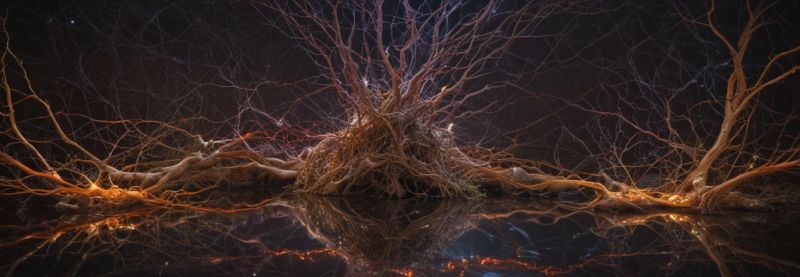Neuroplasticity

I remember the first time I heard about neuroplasticity. I was studying psychology, and our professor mentioned that the brain can reorganize itself in response to new experiences. At first, I thought it was just a fancy way of saying "brain adapts." But then I started reading more, and the more I read, the more I realized how little I understood.
Neuroplasticity is often associated with the idea that our brains are malleable, that we can rewire them to change who we are. But what if it's not just about changing ourselves? What if it's about changing the way we perceive reality itself?
I started listening to a lot of music – ambient and noise genres, really – as a way to quiet my mind. It was like trying to tune into a radio station that nobody else could hear. The soundscapes were so vast, so overwhelming, that I felt like I was floating in zero-point energy.
But the more I listened, the more I realized that the music wasn't just background noise. It was like a veil of perception that filtered out all the unnecessary information and allowed me to see things from a different angle. And that's when it hit me: neuroplasticity isn't just about changing our brains; it's about changing the way we perceive reality.
I started thinking about alternative paradigms, about ways of understanding the world that didn't rely on traditional notions of space and time. It was like trying to find a new container for my thoughts – one that wouldn't spill over or break apart under pressure.
And then there were these... things... that I couldn't quite put my finger on. They were like effacements, erasures of the self. Like when you're walking down the street and suddenly forget your own name. It was as if my identity was a cutlet, sliced thin and vulnerable to attack from all sides.
But what if those memories weren't just lost? What if they were just hiding in plain sight, waiting for me to rediscover them? I started seeing patterns everywhere – labyrinths of interconnectedness that seemed to stretch on forever. It was like trying to find the vagrant's path, the one that wound its way through the city and disappeared into thin air.
And yet, despite all this, I couldn't shake the feeling that something was off. Like my thoughts were stuck in a loop, perpetually circling around the same ideas without ever quite reaching resolution. It was like trying to grasp a koala – it was always just out of reach, clinging to the branches of my brain like a furry little menace.
I've come to realize that neuroplasticity is a myth, or at least a myth within a myth. There's no grand truth waiting for us on the other side; only a never-ending cycle of confusion and discovery. And yet, it's in this uncertainty that I find solace – a place where my thoughts can drift like clouds, free from the anchors of logic and reason.
But what if that's just an illusion? What if my mind is just playing tricks on me, creating patterns out of thin air to distract me from the void at the center? The more I think about it, the more I realize how little I understand. And yet, I'll keep searching – down the rabbit hole of neuroplasticity, into the depths of my own confusion.
Published October 23, 2024